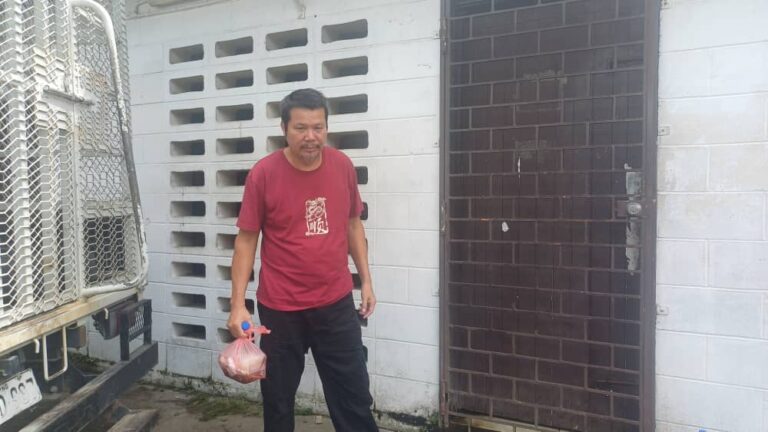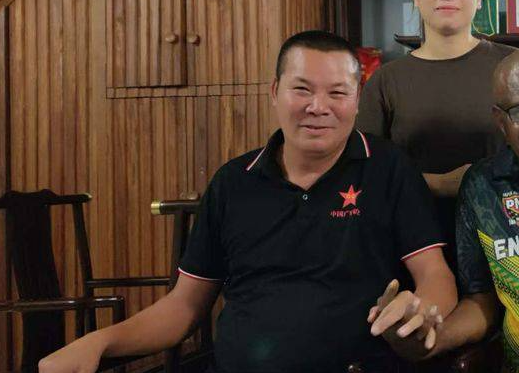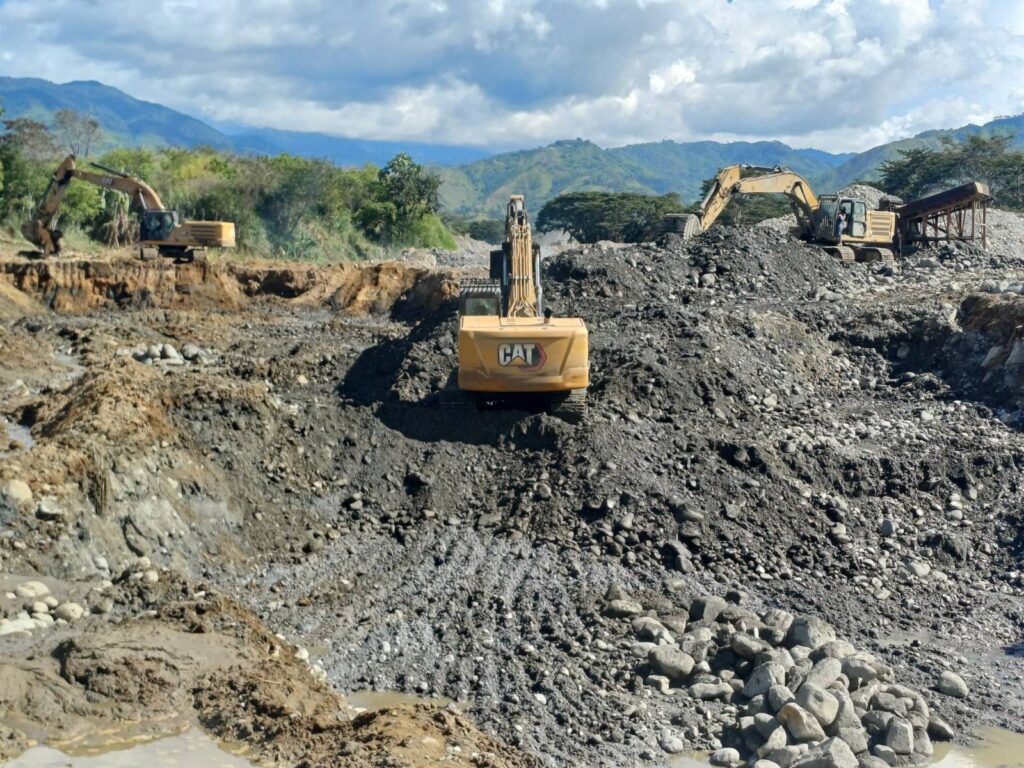Elizabeth Genia was appointed governor of the Bank of Papua New Guinea despite fighting in court to block a police investigation into suspected money laundering. She has not been charged.
By Carmel Pilotti, Aubrey Belford, and Charmaine Yanam
February 10, 2025
The acting head of Papua New Guinea’s central bank was the subject of a police investigation for suspected money laundering when she was permanently appointed to the position in early 2024, according to court documents obtained by OCCRP.
Officers from PNG’s National Fraud and Anti-Corruption Director executed a series of searches on the offices of the Bank of PNG (BPNG) in August and September of 2023 as part of inquiries into its then-acting governor, Elizabeth Genia.
The documents, from PNG’s National Court, show that Genia lodged a legal challenge later that year that managed to temporarily freeze the probe; In legal filings, she argued that investigating her violated her rights to privacy and against arbitrary search and entry. She has not been charged.
The searches were done with the full knowledge of the bank’s legal department, the document’s show.
Genia’s temporary stay was later tossed out by the court. Robert Volo, director of the National Fraud and Anti-Corruption Directorate, declined to comment on whether the investigation is still ongoing.
Genia continues to run the Bank of Papua New Guinea (BPNG) to this day. She did not respond to questions from reporters and didn’t comment on whether she has appealed further to stop the case.
Aside from the money laundering investigation, documents obtained by OCCRP and Inside PNG show that Genia had also previously been put under fraud squad investigation over a deal involving guns for BPNG’s security team. Volo also declined to comment on whether that case is still ongoing.
The police focus on Genia in the two cases — which are not otherwise connected — has not been previously reported.
According to an affidavit filed by police with the National Court, fraud squad officers conducted a series of searches of central bank offices in August and September 2023. They had received information from the central bank’s own intelligence unit showing that Genia was suspected of depositing a “significant amount of money from undeclared sources into her… bank account.”
Fraud squad investigators also said in the affidavit that they suspected that Genia, a long-serving bank official, had received personal payments by check from two companies that had been engaged by BPNG for services. They did not specify what those services were.
The searches of BPNG’s offices came just over six months after Genia was appointed in January 2023 as acting governor of the central bank. Genia’s permanent appointment to the role was announced by PNG’s cabinet in January last year.
Genia mounted a legal effort to stop the investigation, but her effort was ultimately dismissed in April 2024, with the court labeling it an “an abuse of the Court process,” according to a copy of the order obtained by reporters.
The minister responsible for overseeing the central bank, Treasurer Ian Ling-Stuckey, declined to answer specific questions.
“I have just perused the questions and my instincts tell me you’re a fake organization and your approach is very much like our fake opposition. I have no intention whatsoever to meet any of your deadlines nor answer any questions until you verify your credentials,” Ling-Stuckey wrote via WhatsApp.
Ling-Stuckey did not respond after a reporter sent him further information confirming his and OCCRP’s bonafides.
‘Grey List’
The revelations about the investigations add to a turbulent tenure by Genia, who was appointed to run the BPNG after the sidelining of the bank’s former acting head, who had publicly advocated for efforts to crack down on money laundering and corruption.
Adding to her challenges was a warning in 2024 by the Financial Action Task Force (FATF) — a multilateral institution that tackles financial crime — that the country faces imminent “grey listing” over failures to control risks such as public corruption, illegal logging and fishing, and tax avoidance.
Countries are put on the grey list when FATF identifies “deficiencies” in their system to prevent money laundering and terrorist financing. The organization says it “works with these countries… to close the loopholes that allow illegal financial flows.”
Paul Barker, who heads the Institute of National Affairs, a think tank in PNG, said the revelations about police investigations into Genia come amid a “slippage in standards” at the bank, which could complicate efforts at fixing the credibility of the country’s financial sector.
“Papua New Guinea is clearly entering a hazardous period for its critical financial and banking system,” he said.
In addition to the money laundering probe, documents from Genia’s National Court case reveal that she had also been placed under investigation in relation to a questionable gun deal.
The investigation stems from a whistleblower complaint from the bank’s then-head of security. The person claimed that BPNG had improperly contracted with a local company in 2017 to dispose of three pistols belonging to its security team, and purchase 10 new firearms. Genia served at the time as the bank’s assistant governor for corporate affairs. The whistleblower complaint was previously reported in 2020 by PNGi, an anti-corruption website.
The whistleblower claimed that the contract was awarded without tender to a company that was not a licensed gun dealer, and that the guns were not delivered for over a year, despite being paid for in full. The contractor also purportedly failed to supply evidence that it had destroyed the bank’s three older weapons.
An affidavit and exhibits filed by Genia show that police had obtained a warrant in 2020 for records relating to the gun deal. Genia did not respond to questions about the case.
Fight for Control
Revelation of the criminal investigation into Genia throws light on a bitter battle over the top job at the central bank, which has played out in PNG’s courts.
Genia’s replaced the bank’s former acting head, Benny Popoitai, who also headed its financial intelligence section, known as the Financial Analysis and Supervision Unit (FASU).
National Court documents and interviews show that, under Popoitai’s leadership, it was FASU that had furnished the police squad with the financial intelligence that led to the launching of their 2023 investigation into Genia.
After he was forcibly retired from the bank in early 2023, Popoitai sued the bank and Genia to reverse his dismissal but was ultimately unsuccessful.
Popoitai told OCCRP that the bank’s financial intelligence unit uncovered what it believed to be Genia’s suspicious transactions, but he added that it was not involved in pursuing the case after that.
“FASU provided the information to the fraud squad,” Popoitai said. “Once FASU provides information, they have to step back — that information cannot be used in court. The police use that information to do their own investigation.”
During his tenure, Popoitai had taken an aggressive stance against rampant corruption and financial crime in PNG, a vast and resource-rich country that nonetheless struggles with widespread poverty.
Among Popoitai’s most confrontational acts involved launching both civil and criminal complaints against Puma Energy, a subsidiary of global commodities giant Trafigura that supplied much of the country’s fuel. The complaints contended that Puma had carried out “money laundering” by moving over $200 million worth of PNG’s tightly controlled foreign currency reserves overseas without obtaining permission from the central bank.
Puma Energy defended the foreign currency transfers, saying they were necessary to pay for imported fuel.
The resulting confrontation led Puma to dramatically scale back its operations in PNG, leading to a rolling fuel crisis that shut down flights and led to long lines and closures at petrol stations. Regular fuel supplies have since resumed in PNG, after intervention from other suppliers.
Genia did not respond to questions about the status of any civil or criminal investigations into Puma.In response to reporters’ questions, the company said: “There are no ongoing court cases between Puma Energy and the BPNG. The BPNG’s claim for injunction relief in 2022 was dismissed and ruled in Puma Energy’s favour. The court case was then discontinued.”
February 10, 2025




